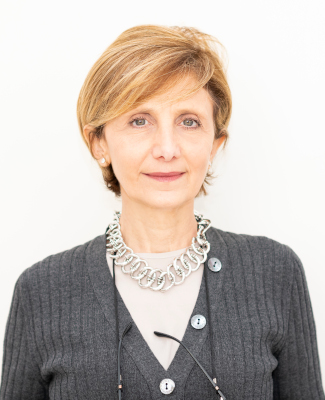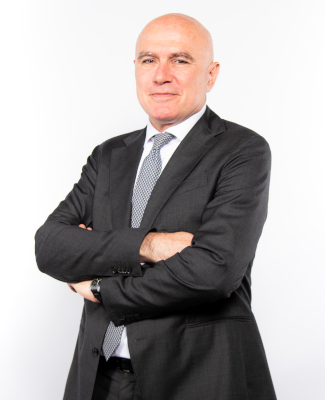Board of Directors

Paola Firmi
Chairman

Aldo Isi
Chief Executive Officer
and General Director
Directors
Antonella Faggi, Manolo Cipolla, Sabrina Lai
Board of statutory auditors
Chairman: Leonardo Quagliata
Statutory auditors: Lorenzo Brocca, Simona Vittoriana Cassarà
Alternate auditors: Gaetano Giudice, Maria Pia Erica Nucera
Chief Executive Office and General Director: Aldo Isi
Regulatory Affairs and Antitrust: Raffaella Marciani
RFI Communication Business Partner: Egle Bianco
Strategy, Sustainability and Development Planning Infrastructure Department: Christian Colaneri
Purchasing Department: Gennaro Ranieri
Legal, Corporate Affairs & Compliance Department: Claudio Maria Oriolo
Negotiating Affairs and International Programs Department: Gianfranco Pignatone
Administration, Finance and Control Department: Andrea Pascucci
Internal Audit Department: Andrea Santolini
HR and Organisation Department: Diego Giacchetti
Security Department: Riccardo Barrile
Circulation & Timetable Department: Daniele Moretti
Investments Department: Lucio Menta
Infrastructure Operations Department: Luca Cavacchioli
Technical Department: Efisio Murgia
Stations Department: Giuseppe Sciumé
Health Department: Giuseppe Saffioti
Industrial Planning and Control: Andrea Esposito
Tid Business Developer: Giampiero Noto
Research & Development: Fabio Senesi
Risk & Anti-Corruption: Giovanni Conti
Corporate Affairs Business Partner RFI: Grazia Maria Rita Pofi
Management Systems and Safety: Gian Fabrizio Ghiglia
Ceo Office RFI: Sergio Salvio
Further important governance bodies are the Committees set up by the CEO in relation to the specific needs of the Company to address, further and monitor issues/areas of strategic relevance for the Company relating to processes traversal to several organisational structures. Below are some of the main committees set up by RFI and the FS Group Equal Opportunities Committee currently chaired by an RFI representative.
The Ethics Committee
The Ethics Committee was founded in 2006, with an advisory and guidance role, to facilitate the integration of ethical criteria into the decision-making processes of the various company stakeholders, to verify the conformity of actions and behaviour with the defined standards of conduct and to review corporate procedures in view of the Code of Ethics and its constant updating.
The 231 Steering Committee
The 231 Steering Committee was set up with the task of routing the work, evaluating the proposals of the 231 Work Group and ensuring a regular flow of information to the Managing Director and General Manager, the Supervisory Board and other Supervisory Bodies/Committees.
The Sustainability Committee
The RFI Sustainability Committee was established in 2020 to strengthen sustainability governance.
In keeping with the FS Group’s Sustainability Committee, the RFI Committee was set up to ensure that the principles and values of sustainable development and the long-term 2030–2050 objectives are better integrated into the strategic decisions of RFI and its subsidiaries, with a view to creating value for all stakeholders and involving all levels of the company. It is chaired by RFI’s CEO and includes all the heads of Departments/Divisions reporting directly to them.
Depending on the issues dealt with, the Managing Directors of the subsidiaries are also involved in the Committee’s activities. The Committee with the advisory function is tasked with supporting the CEO in their capacity as Chair of the Sustainability Committee, in evaluating and deciding on strategic, operational and governance choices/plans to be implemented for continuous improvement of RFI’s sustainability profile and its contribution to sustainable development.
The Audit and Risk Control Committee
Founded in 2010, the RFI Audit and Risk Control Committee has propositional and advisory functions vis-à-vis the Board of Directors. It constitutes an important component in developing the Company’s governance system and represents an opportunity and forum for the preliminary analysis of issues relevant to the internal control system.
The Audit Committee’s activities include:
- Examination and sharing of the annual Audit Plan drafted by the Audit Department for subsequent approval by the Board of Directors;
- Examination of the Audit Reports produced;
- Periodic review of the adequacy, effectiveness and actual functioning of the internal control system of RFI and its subsidiaries, conducted at least at the time of the annual and half-yearly reports;
- At the request of the Chief Executive Officer, an examination of the findings emerging from the Audit Reports;
- Examination of internal controls in view of the main corporate risks being identified;
- Examination of the rules for the transparency and substantive and procedural fairness of transactions with correlated parties and those in which a director has an interest, on their own behalf or on behalf of third parties;
- Expressing opinions on proposals for the appointment and dismissal of the Audit Director formulated by the Chief Executive Officer in agreement with the Chair of the Board of Directors, to whom they report hierarchically.
The Equal Opportunities Committee
The Ferrovie dello Stato Italiane Group’s Equal Opportunities Committee is a bilateral and joint body that upholds principles of gender equality and non-discrimination between workers.
The Equal Opportunities Committee is representative of the Group companies and trade unions that are signatories to the National Collective Bargaining Agreement for the Railway Sector and the FS Italiane Group Corporate Contract (16 December 2016), aiming to protect the rights, encourage the presence and promote the participation of female resources in the company and to achieve substantial equality between genders in the workplace.
The Equal Opportunities Committee is composed of one representative from each Trade Union Organisation that is signatory to the Contract and a corresponding number of members designated by the FS Group Companies. In addition to full members, each party appoints its alternate representative who participates with voting rights in the absence of the full member.
It is comprised of:
- 1 National Equal Opportunities Committee at a Group level;
- 15 Territorial Equal Opportunities Committees, also of the Group, with the Equal Opportunities Committees of Liguria, Piedmont-Valle d’Aosta, Lombardy, Veneto, Verona-Trentino Alto Adige, Friuli Venezia Giulia, Emilia Romagna, Tuscany, Le Marche-Umbria-Abruzzo, Lazio, Campania-Molise, Puglia-Basilicata, Calabria, Sicily and Sardinia.
The Safety Culture Committee
The Safety Culture Committee is made up of the Heads of the Central Departments involved in the Safety Management System (SMS) and the Head of the Integrated Safety Management System (ISMS), serving to:
- Clarify the meaning and application of the Safety Culture Code through advisory opinions;
- Promote improvement actions through the sharing of experience and information, however acquired, with a view to developing a culture of safety and a human-factor approach;
- Support the competent corporate structures in defining communication and/or training initiatives for management and personnel, concerning the Safety Culture Code and its updating;
- Propose any necessary amendments/additions to the Safety Culture Code;
- Periodically inform the Managing Director and General Manager of the activities carried out, with particular reference to the handling of the reports received.
The Safety Culture Committee relies on the operational support of the Central Directorates/Facilities in carrying out its work.
The Work Safety and Environment Committee
The Safety, Labour and Environment Committee represents the Top Management for the Environmental Management System (EMS) and the Occupational Health and Safety Management System (OHSMS) of RFI, comprised of the Heads of the Central Departments/Facilities.
The Safety, Labour and Environment Committee serves to:
- Define and propose to the CEO and General Manager the Environmental Protection Policy and the Occupational Health and Safety Policy;
- Define and propose the EMS and OHSMS Manuals to the CEO and General Manager;
- Effectuate the RFI Management Review for the EMS and OHSMS, prepared by the Head of the Integrated Safety Management System for subsequent approval by the CEO and General Manager;
- Approve Level II documentation governing how mandatory legal requirements on occupational health and safety and environmental protection are managed.
The Safety, Labour and Environment Committee is chaired by the Chief Executive Officer and General Manager.
The Steering Committee
The Steering Committee is comprised of the Heads of the Central Departments involved in the Safety Management System (SMS) and the Head of the Integrated Safety Management System (ISMS)– which, as a whole, represents the Top Management for the RFI SMS – and carries out the Management Review of the RFI SMS.
The Steering Committee is chaired by the Chief Executive Officer and General Manager.